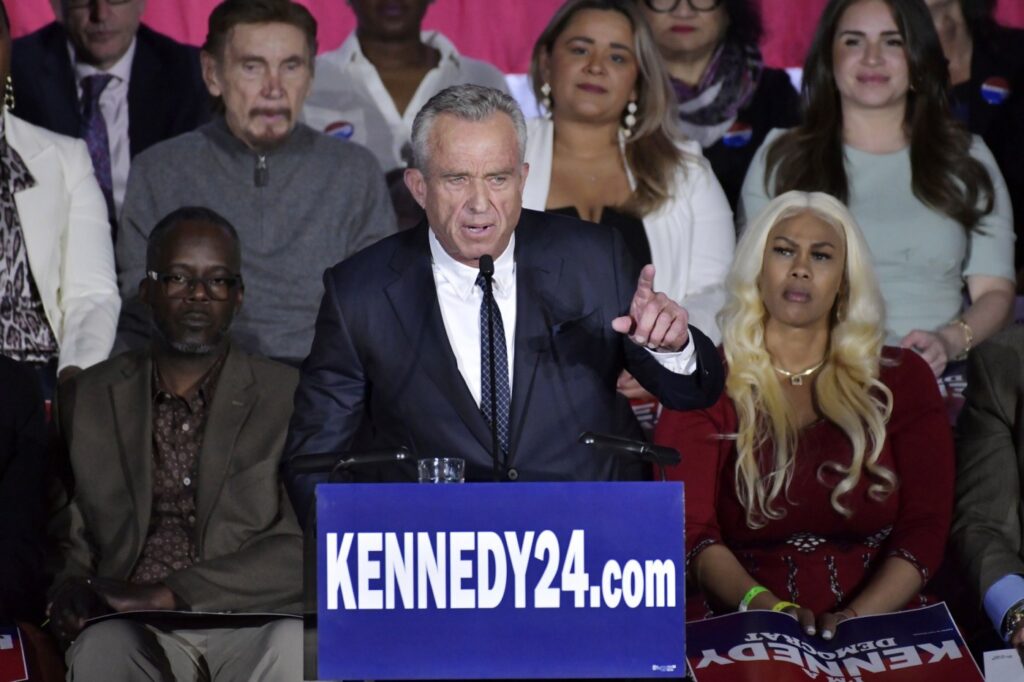
Is it just me or does it feel like Vivek Ramaswamy and Robert F. Kennedy Jr. are everywhere?
Six months ago, you couldn’t find two people from Anchorage to Boston who could tell you who Vivek Ramaswamy was, nor would those same two people ever imagine a Kennedy trending among Republicans. The rapid political rise of these two men boils down to one thing: A wholehearted embrace of the fragmented media landscape.
Unless your name is Donald Trump and you can gin up breathless, wall-to-wall publicity at the drop of a hat, successful political candidates today must embrace the full spectrum of modern media to create the illusion of omnipresence. They must be “everywhere” to break through to voters, and embrace a strategy aimed at flooding the zone. Both Vivek and RFK Jr. have done that, and their rewards have been rising poll numbers and millions of dollars in donations. In other words, they are winning in the race for momentum and energy.
To employ the “everywhere” strategy, candidates must not only seek traditional media appearances, but also speak to a wide array of bloggers, podcasters, and digital-only media outlets. Capturing the attention of anyone with a platform will require building a campaign team dedicated to constant content creation in-house, and cultivating connections with social media influencers who can help get that content in front of eyeballs. While nothing will replace a robust political ground game, gone are the days of coupling door knocking and handshaking with photo ops and TV ads.
In 1920, newsreels and radio stations were taking off across America. That year’s presidential election pitted two newspapermen from Ohio against each other: Republican Warren G. Harding and Democrat James M. Cox. Harding won with over 60 percent of the popular vote, with many crediting his victory to embracing the modern age of media and being everywhere—all while never leaving his front porch. He hosted Hollywood actors, jazz musicians (a hot new genre at the time), and even professional baseball games. Harding bussed in tens of thousands of supporters and made time for his colleagues in the newspaper business. All of this made for priceless fodder to millions of Americans watching newsreels and tuning into radio stations from the comfort of their homes.
The same transformative media experience is happening today, over a century later. Media is fragmented like never before, and while it now requires more effort and costs more money to reach people, the upside is that many millions more voters are not only reachable but can also be contacted in numerous ways. Like Vivek and RFK Jr., you can seemingly be everywhere. Both campaigns prioritize content creation, both candidates never met a platform they were afraid to connect with, and both movements have touched voters who never knew their names half a year ago.
From RFK Jr.’s appearance on The Joe Rogan Experience to Vivek’s conversation with The Breakfast Club, these may be uncharted waters, but winning politicians will take the plunge. The age of old-school politics is over.
Just look at Rep. Alexandria Ocasio-Cortez, D-New York. She took out one of the most powerful members of the House by leveraging viral content from her casual neighborhood campaign stops, new social media trends, regular appearances on a wide array of podcasts and vlogs to speak directly to left-leaning voters in her diverse district. The result was ousting a House member who no longer represented the kind of district he once did.
Related Articles
Santa Ana law will destroy city’s rental market
Convicted criminal Dave Min should drop out of Orange County congressional race
Ron Hart: Vivek Ramaswamy might be the one to take on the big government leftists
No more excuses for FDR’s concentration camps for Japanese-Americans
John Stossel: COVID cases are on the rise, but governments shouldn’t overreact
On the other side of the aisle, Rep. Dan Crenshaw, R-Texas, elevated his own standing on the campaign trail by appearing on the Jocko Podcast, reaching countless viewers and listeners who began to view the candidate in a different light. Months later, an inappropriate joke made by Pete Davidson on Saturday Night Live launched Crenshaw into a new level of notoriety. His gracious forgiveness and subsequent “Weekend Update” appearance gave Crenshaw exposure to new audiences with whom he openly interacted and embraced.
In 2024, the candidate most omnipresent with a message that can resonate beyond base party voters will win. Donald Trump is a once-in-a-century public figure who is an exception to almost every rule in politics. There is only one Trump, and only a fool would think they will be successful in imitating him.
If your name isn’t Donald J. Trump, the winning formula is to embrace America’s new media landscape and use it to your advantage. In an era where there are literally millions of podcasts, thousands of social media influencers, hundreds of online news publications, and dozens of relevant cable news channels, the future of media is not consolidation; it is only further fragmentation. People will continue to consume content in wildly different ways, and political candidates better keep up by creating, creating, and creating some more.
Will more politicians listen? Like most things, not at first, and only if they see fragmentation as a path to more money raised and increased influence. Well, it is, and it is the path to victory in 2024 and beyond.
T.W. Arrighi serves as Vice President at Push Digital Group.
